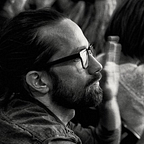The Obligations of Ahab
I imagine his wife. With her palm against her pregnant stomach, she tells him about a life that is beginning inside of her. Since the loss of his leg, he had only been capable of an imagination of endings. For himself or the whale or both. But some strange new flower blossoms. She asks him to stay.
I imagine that (somehow) he does.
It takes years, but his fists begin to uncurl. They buy one of those glider chairs so that rocking the baby to sleep can remind him of the waves lifting and lowering a whaling boat, but it doesn’t work. He keeps thinking quietly to himself that he wasn’t built for this purpose. He does not know what to do with himself.
What use is he? What use is the astrolabe and the sextant when, after dropping the kiddo off at day care, he drives home and sits there in his strangely quiet home and feels deeply and sincerely lost? What use is his knowledge of every warm current and biting wind when sitting with the boy in a crowded urgent care waiting room? What use is this white-knuckled rage while holding a small tooth brush, moving it gently across the reddenned, teething gums of a 4-year-old? In pulling socks off of a sleeping child without waking him? In apologetically measuring purple syrup from the medicine bottle? In pointing out the tag and showing how to put on your underwear so that the front is in the front? In cutting the french toast into smaller squares, the way mom does, because it tastes better that way? What use are we, are any of us, Ahab?
There is a dull but piercing moan when Ahab, having twice already announced that it’s time for bed, lifts up the remote control and turns off the television. The sound of the cry stirs nothing in him and he wonders if he is broken, and how he is broken, and wants in that moment to ressurect an old and familiar pain. What was the shape of it? He traces something onto the back of the kid, who is sobbing into his shoulder.
One night Ahab finds himself swallowed whole by the obligations of a puppy, who was a Christmas present for the kid. Ahab stands outside in the dark at 2AM, his peg leg sinking into the winter mud while he whispers, “let’s go potty now, be a good boy and potty, let’s go potty Charlie, let’s potty” at this 10 week old puppy. He feels his entire chest pulling like a magnet toward an ache in which he once understood himself.
It wasn’t that he was better when his blood burned and his intention was singular, moving syllable by syllable toward this white ghost hidden under the waves. But he was Ahab then. And where is the whale now, elusive in his memory the way it was once in an infinite ocean? That whale and that Ahab are a pair of cottonwood seeds on the wind now. Floating away from him.
One day, Ahab will carry his son the last block home from school. The boy’s arms dangling useless and his body limp. Ahab’s right arm will pin the weight of the boy against his father’s winter coat. In his left hand, Ahab will carry a watercolor painting of a frog that cannot be bent or folded (or the boy might shatter) and a backpack (which slides down to his elbow). When they make it to the last street, the boy reaches for his father’s hand, because “we always hold hands when we cross the street.” Ahab lifts the arm with the backpack and the watercolor and offers a single digit to hold onto. The boy grabs Ahab’s pinky finger and grips it tightly. Ahab steps off the curb and where in this, in any and in all of this, is there room to hold onto anything else?
